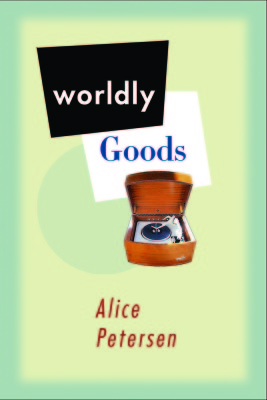What a thrill to follow a writer from promise to fulfillment. Alice Petersen’s debut collection of short stories won the 2012 QWF Concordia University First Book Prize and marked her as a young writer to watch. Her second collection, Worldly Goods, more than delivers.
Whereas All the Voices Cry was concerned with intimate loss, here Petersen has cast her thematic net more widely, and more confidently. The fifteen stories in Worldly Goods are redolent of a universal, inexorable human loneliness: the thoughtful aftermath of loss. Neither reeling nor quite whole, the characters wax epistolary about the one that got away, they seek unlikely escapes on solo holidays, they help lost boys and hang onto lost poems. Yet the stories are never dour. The reader feels she has known these people, their deep solitude, all along. It is the writer, not the character, whom we meet in the charmer’s arms, on the dislocating vacation, in the tired kitchen, and she generously shares her sense of omniscience and irony with those who people her stories.

Worldly Goods
Alice Petersen
Biblioasis
$19.95
paper
176pp
9781771960809
Always an intuitive stylist, Petersen has honed her prose. I love the creepy, bathetic “Lovely to Touch, Lovely to Hold”; I love “A Nice, Clean Copy” – how we give of our flawed selves, instead of the gift of knowing the other. Petersen is master of the telling detail. We are told of a runaway that “someone had cared enough about him to take him to the dentist.” A raucous do is evocatively qualified as “a street party where the sofas were set on fire.” Yes, exactly.
You’ll read on for the satisfying dissatisfaction of others, but it’s the language that’ll hook
you. A poor choice for a wife is referred to as a “dandelion clock,” department-store box-room thugs are “sexist baskets,” rummage-sale women are “manatees in tweed skirts.” A minster here, a jerkin there, but Petersen’s is no passing ten-dollar vocabulary; it is aptly used, and well earned.
Where a less able writer might belabour the figurative, or load Venice, Aeneas, and co. down with research, Petersen weaves a solid but unobtrusive lattice. The time to vacation in Italy, she counsels, is “after the crowds but before the storms” – good advice all round. In “Dear Ian Fairfield,” “Dido sings for ages while she is dying,” Prudence muses. “There is always so much ground to cover before the end.” If the ground ahead for Petersen might include fixing a tendency to tinny titles and occasional non-endings, the author’s pen is nonetheless firmly in her service.
These criticisms of Worldly Goods are of an editor’s eye. The reader’s reading organs – mind’s eye, escapist heart, palate for language – are delighted. As when she compares an unfortunately pregnant girl to “a golden pear,” Petersen wields the beautiful and the richly out of place. The book is a well-set table. mRb






0 Comments